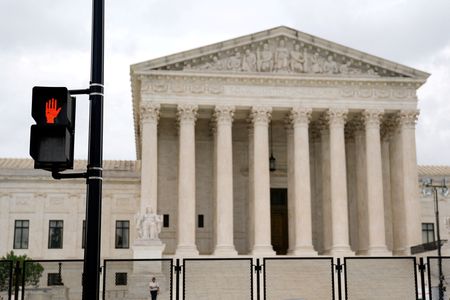By Nate Raymond
(Reuters) -The U.S. Supreme Court on Monday declined to again hear a multi-billion dollar case pursued by shareholders of Fannie Mae and Freddie Mac arising from the federal government’s takeover of the mortgage finance firms during the 2008 financial crisis.
The justices turned away an appeal by the investors of a lower court’s ruling against their challenge to a 2012 agreement that resulted in hundreds of billions of dollars being redirected from Fannie Mae and Freddie Mac to the U.S. Treasury. The shareholders had argued that this arrangement unlawfully deprived them of dividends without compensation.
The private investors pursuing the appeal at the Supreme Court include Bruce Berkowitz’s Fairholme Funds and funds managed by New York-based Owl Creek Asset Management.
Fannie and Freddie were created by Congress and operate as for-profit corporations with private shareholders, with the mission of expanding the national home lending market by buying home loans from private lenders and repackaging them as mortgage-backed securities.
When the housing market collapsed in 2008, the companies suffered overwhelming losses. To avoid catastrophic effects for the U.S. economy, they were placed in conservatorship under the newly created Federal Housing Finance Agency.
The case before the Supreme Court arose from of a myriad of lawsuits that private shareholders filed over the 2012 agreement between the U.S. Treasury and the FHFA aimed at repaying the government for the bailout.
The 2012 agreement required Fannie and Freddie to pay the U.S. Treasury quarterly a sum equal to the amount that their net worth exceeded a specified capital reserve. The investors have said this resulted in an unwarranted government windfall of $124 billion.
The Supreme Court considered the agreement in an earlier case in 2021, agreeing with shareholders that the FHFA’s structure was unconstitutional but throwing out a core part of the challenge to how the 2012 deal was administered.
The latest case concerned shareholder claims that the agreement, called the “net worth sweep,” violated the U.S. Constitution’s Fifth Amendment requirement that the government provide “just compensation” when private property is taken for public use.
Lower courts agreed with the government that the shareholders lacked the right to sue because their lawsuits amounted to an allegation that the companies had overpaid the Treasury, and only Fannie and Freddie could sue to recover that money.
While the shareholders argued that the 2012 agreement directly harmed them, the U.S. Court of Appeals for the Federal Circuit agreed with a federal judge that their claims failed under Delaware law, which governed the shareholders’ rights.
(Reporting by Nate Raymond in Boston; Editing by Will Dunham)

